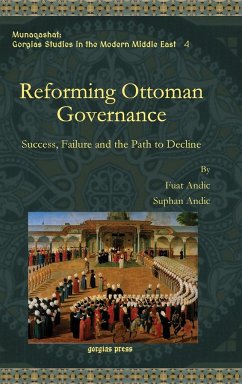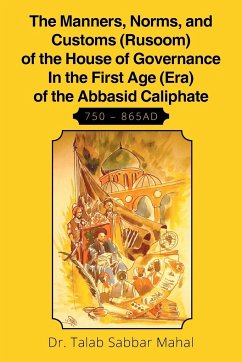
Reforming Ottoman Governance
Success, Failure and the Path to Decline
Versandkostenfrei!
Versandfertig in 1-2 Wochen
169,99 €
inkl. MwSt.

PAYBACK Punkte
85 °P sammeln!
The book is the history of reform attempts in the Ottoman Empire and the internal and external difficulties in implementing them. Imperialist aggression towards the Empire and bloody janissary revolts hampered the reforms, and although some successes in governance were achieved, there were many failures, and these contributed to the demise of the Empire at the end of the First World War. Reforms began in 1718 during the period known as the Tulip Era, which ended in 1730 with a bloody janissary uprising. Sultan Selim III, who reigned from 1789 to 1807, then tried to engage with domestic and mil...
The book is the history of reform attempts in the Ottoman Empire and the internal and external difficulties in implementing them. Imperialist aggression towards the Empire and bloody janissary revolts hampered the reforms, and although some successes in governance were achieved, there were many failures, and these contributed to the demise of the Empire at the end of the First World War. Reforms began in 1718 during the period known as the Tulip Era, which ended in 1730 with a bloody janissary uprising. Sultan Selim III, who reigned from 1789 to 1807, then tried to engage with domestic and military reform. His reform efforts conflicted with the interests of both the janissaries and the religious leaders and made the sultan a victim of another janissary uprising. Mahmud II, successor to Selim III, strove to change the paradigm of governance with his personal administration. His most daring action was the eradication of the unruly janissary organisation. The concept of a constitutional monarchy penetrated the Empire, first in the form of Tanzimat in 1839, and subsequently with the issuance of a constitution in 1876. The sultan of the time, Abdülhamid II, became convinced that he could run the Empire alone and suspended the constitution. He was dethroned by a military coup in 1909. The janissaries had disappeared from the Empire, but their mentality had not. A new constitution was declared by amateur politicians and military officers, members of a revolutionary committee known as 'Union and Progress', also known in the West as the 'Young Turks'. They were well intentioned, but faced two disastrous wars, one in Libya, the other in the Balkans. Their administration quickly degenerated into a dictatorship and they had hardly enough time to carry out any meaningful reforms. In 1914 the Ottoman Empire entered the First World War together with Germany, the death knell of an empire that had lasted seven hundred years.












